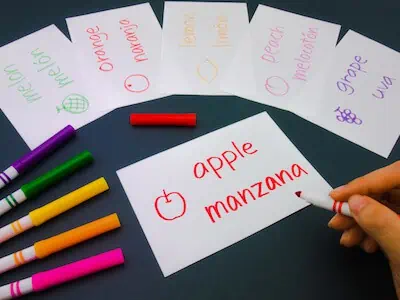Notice anything lately? Yes, you’re wondering why I’ve been discussing languages and being bilingual in my topics lately. So many people ask me how my husband and I do this with two completely different backgrounds.
We make it work, and there are millions of households here in the US and worldwide where more than one language is spoken in the home. This commonly happens in a situation like ours where we are from different countries and backgrounds.
However, even if you’re from the same background as your spouse, you can still decide to teach your child another language. You may even learn something yourself in the process.
As a kid, I remember one of my friends Allyson Goldstein always had to go to Hebrew school to study for her bat mitzvah. I was curious because Allyson could read Hebrew, which fascinated me since you read it from right to left instead of left to right.
Her parents were Jewish, but neither of them spoke Hebrew at home. Yet she was to learn all these things and recite them for her bat mitzvah. I found it amazing, especially since I learned just Spanish in school.
From my last post, you can see that learning another language is hugely beneficial for your kids.
But how do you know which language you should teach them?
Let’s talk about a few of the more common second languages we hear around us. With over 7,100 languages spoken globally, you’ve got lots of choices. Yeah, that boggled my mind, too, since I can maybe name 50 of them easily off the top of my head without pausing.
Spanish was what I learned in school. And that makes a lot of sense because, in the US, it’s the second-most widely spoken language (4th worldwide). Knowing Spanish helped me find my way back to the airport in Miami when I took a wrong turn. It also helped me order food easily and get directions in Mexico.

Spanish is also a romance language because it has Latin roots with other languages, including French and Italian. That’s precisely why even though I never learned French or Italian, I figured things out when traveling through Europe.
French is another excellent language that may help you here, though I didn’t think so as a teen. I could take French and stuck with Spanish for an easy A. But if I’d learned French instead of figuring it out while traveling, I’d have been better able to communicate while there.
German was the other option offered at my high school. I can’t recall anyone that actually took it though I did have a German boyfriend at one point, and I learned a thing or two from him.
Then there’s Chinese which is further split into Mandarin and Cantonese. My husband speaks Mandarin but knows enough Cantonese to talk with those from Cantonese regions. I feel that Mandarin is one of the most important to learn in today’s global world. Not because my husband is Chinese and our kids are half-Chinese, but because there are so many Mandarin speakers.
It’s tricky, too, for there is no alphabet to learn. You have to memorize the characters, so I always felt speaking Chinese was way easier than learning to read it.
So, with all these languages (and obviously many, many more of them), it may make you wonder what you should have your child learn.
This will be an easy decision if you speak two languages at home. Let’s use my house as an example; I am a native English speaker, and my husband is a native Mandarin speaker. As I’ve mentioned in my recent posts, we speak both in our home.
But what if you and your husband are both Americans that speak English? How do you choose a language to teach your child in that situation?
In this case, I recommend looking at your ancestry and lineage. We all got to America from somewhere. Perhaps your ancestors were from Russia, Korea, France, Vietnam…I could go on and on. In any event, this is where I’d start.
Especially if you have any older relatives that speak languages from the old country, it would be wonderful for you to dig into your roots and learn them together as a family.
If that doesn’t help, then I’d think about your geographical location next. For example, if your ancestors came from England, that’s not a different language (more like a different accent). So, how do you decide what language to teach your kid, then?
Look at where you live:
Spanish is a great way to learn if you’re in the southern states along the border or over in Florida. There are tons of Spanish speakers in these areas. But there are clusters of other cultures too.
In NYC, there’s a huge Chinatown. You have communities with people from India, Russia, and worldwide. Choosing one of these languages can only add more joy to your life.
You can think about what the schools teach in your area and align with that, so it’s easier for your child when they are taught languages in school. Or you can look for cultural organizations you can join in your neighborhood. They often have activities for kids, which will be a terrific way for your whole family to make new friends and learn something new.
For the globetrotters out there, you may want to learn the language of the next place you’ll visit. You may not become fluent in it, but locals love to hear you try. When I was in China, people would be overjoyed that I attempted to speak Mandarin to them. They don’t care if your grammar is wrong…they love that you’re trying and will go above and beyond to help you out.
If you’re still unsure what language to teach your child, consider this…
Your child can become even more valuable in their chosen profession if they speak another language. Obviously, it depends on what they want to be when they are adults.
But a child interested in business, politics, the government, or a travel-related field will have more opportunities to pick and choose from when they speak another language. That value becomes even greater when your child can speak more than two languages. If you raise a polyglot, be prepared for people to fight over your high-achieving child.
However, please do not push it. Language should be fun, and learning to enjoy the culture of others should be too. While we want our kids to speak our languages, when we only have English, we want them to be excited about learning something new, or else they will only see it as a curse rather than a blessing.
Leslie Berry lives with her husband and two young daughters in Los Altos, California, where she loves helping other moms get comfortable with motherhood and embracing the insanity with facts peppered with laughs.
She loves eating too much sushi, exercising, and jamming out on her Fender. Read more about Leslie here.





